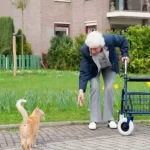The Death Of A Pet Should Be Taken More Seriously By Counselors
The post The Death Of A Pet Should Be Taken More Seriously By Counselors appeared first on Healthy Holistic Living.
Losing a pet can bring about a profound sense of grief, yet the significance of this loss is often overlooked in society. A new review aims to raise awareness among counselors about the importance of recognizing and addressing the grief experienced by individuals whose pets have passed away.
Disenfranchised Grief and the Need for Validation:
When relationships are not valued by society, individuals are more likely to experience disenfranchised grief after a loss that cannot be resolved and may become complicated grief, according to Colleen Rolland, President and pet loss grief specialist for the Association for Pet Loss and Bereavement. In a recent statement, she emphasizes the impact of societal devaluation of pet relationships on individuals’ grieving process. To foster a supportive and non-judgmental space where clients’ expressions of grief are validated, the review provides counselors with new perspectives to consider in their therapeutic work.
The Lifesaving Role of Pets and Historical Significance:
During the start of the COVID-19 pandemic, when lockdowns confined a third of humanity to their homes, pet ownership and the time spent with pets significantly increased. Studies showed that pets played a lifesaving role in alleviating isolation and improving overall well-being. The influence of our furry friends on our quality of life cannot be underestimated. Pet cemeteries across the globe stand as historical evidence of the deep emotional connection humans have had with their pets for centuries.
Neglected Grief: Changing Perceptions:
Despite the undeniable value pets bring to our lives, grieving the loss of a pet often fails to receive the recognition it deserves. Colleen Rolland and Dr. Michelle Crossley, Assistant Professor at Rhode Island College, argue that society’s trivialization of pet loss can complicate the healing process and be detrimental to an individual’s health. This neglect may discourage people from seeking help when they truly need it.
Strategies for Supporting Grieving Clients:
Counselors have several strategies at their disposal to support clients experiencing pet loss grief:
Group Counseling Sessions: Encouraging clients to participate in group counseling sessions, either in-person or virtually, provides a space for them to connect with others who have experienced similar loss. These sessions offer communal support, validation, and understanding, helping individuals navigate their grief.
Therapeutic Arts and Crafts: For children grappling with the loss of a pet, engaging in therapeutic arts and crafts activities can facilitate the grieving process. These creative outlets allow children to express their emotions and cope with their grief constructively.
Empowering Counselors and Enhancing Treatment:
The review by Rolland and Crossley aims to empower counselors by highlighting the significance of pet loss for their clients and the need to validate their grief as an integral part of the healing process. It emphasizes integrating pet loss work into existing counseling interventions and coping strategies to provide accessible and effective treatment.
Recognizing the Widespread Impact:
Statistics illustrate the scale of pet ownership and the potential scope of grief associated with pet loss. According to the American Pet Products Association, nearly 85 million families, approximately 67% of U.S. households, own a pet. These numbers demonstrate the significant number of individuals who may experience the loss of a beloved pet, emphasizing the importance of addressing pet loss grief.
Understanding Pet Loss Grief:
While specific studies on pet loss grief may be limited, a growing body of research recognizes the profound emotional impact of losing a pet. Some studies compare the grieving process for pet loss to that of losing a human loved one, highlighting the similarities in the stages of grief experienced. Kübler-Ross’s five stages of grief—denial, anger, bargaining, depression, and acceptance—provide a framework for understanding the emotional journey individuals go through when mourning the loss of a beloved pet.
Expanding Perspectives
In addition to the recommended strategies mentioned earlier, counselors can explore additional approaches to support clients experiencing pet loss grief:
Pet Loss Support Groups: Encouraging clients to join pet loss support groups provides them with a dedicated space to share their experiences, exchange coping strategies, and receive empathy and understanding from others who have gone through similar losses. Online forums, social media groups, and local community organizations often offer these support networks.
Pet Loss Memorials: Creating a memorial or tribute to honor the deceased pet can be a cathartic and healing process. Counselors can suggest various memorial options, such as planting a tree or flowers in memory of the pet, making a scrapbook or photo album, or writing a heartfelt letter expressing emotions and cherished memories.
Rituals and Ceremonies: Encouraging clients to engage in rituals or ceremonies to mark the passing of their pet can provide closure and a sense of honoring their bond. Lighting candles, holding a memorial service, or participating in a symbolic act like releasing balloons or lighting a sky lantern can help clients find meaning and say goodbye.
Self-Care and Coping Strategies: Supporting clients in developing healthy coping strategies and self-care routines is crucial during the grieving process. Encouraging activities like journaling, practicing mindfulness or meditation, engaging in physical exercise, and seeking solace in nature can assist clients in navigating their grief.
Pet Loss Education and Resources: Counselors can enhance their knowledge and understanding of pet loss grief by exploring educational resources, books, and articles dedicated to the topic. Familiarizing themselves with the unique challenges and dynamics of pet loss grief equips counselors with the necessary tools to provide effective support.
Conclusion:
The death of a pet should not be trivialized or dismissed as insignificant. Counselors play a vital role in supporting individuals navigating the complex and challenging terrain of pet loss grief. By recognizing and validating the grief associated with pet loss, counselors can provide crucial support and facilitate the healing process. Through group counseling, therapeutic arts and crafts, and integration of pet loss work into existing interventions, counselors can create a safe and empathetic space for clients to navigate their grief. By broadening perspectives, exploring additional strategies, and utilizing available resources, counselors can ensure that clients receive the comprehensive support they need during their pet loss grief journey.
The post The Death Of A Pet Should Be Taken More Seriously By Counselors appeared first on Healthy Holistic Living.












